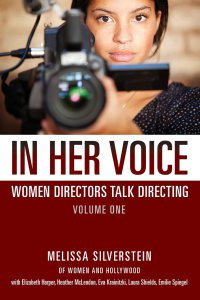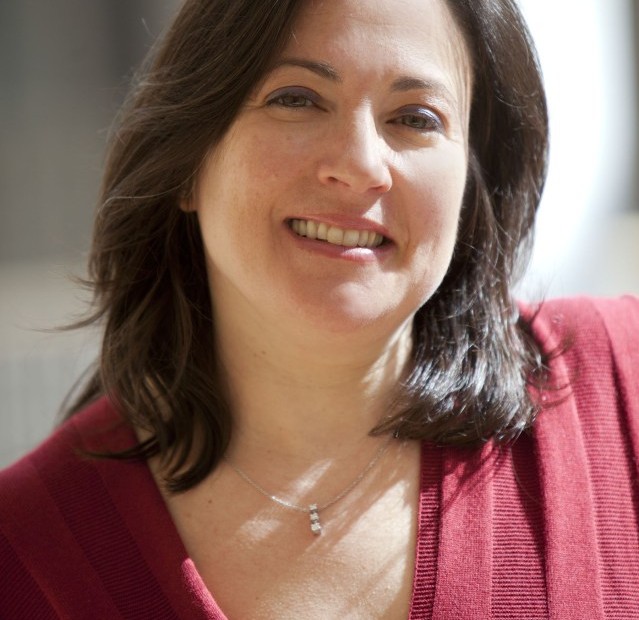By Daria Landal
This time, we bring you an interview with a writer and activist Melissa Silverstein, one of the best and most respected experts on the subject, and a founder/editor of the blog Women And Hollywood. Read our new entry in a campaign for female filmmakers below!
If you were looking for a vocal and dedicated advocate of female filmmakers in today’s media, you would hardly find someone better than Melissa Silverstein.
Based in New York, Silverstein is a journalist whose work is featured in NY Times, Forbes, CNN, BBC and many other publications; she is also Artistic Director of The Athena Film Festival and a film envoy for American Film Showcase. This year, she published her first book, In Her Voice, compiling her numerous interviews with female directors.
One of Silverstein’s biggest achievements, though, is her own blog Women And Hollywood, one of the world’s most respected online sources tackling the involvement and portrayal of women in the movie industry. Surprisingly, it’s not something Silverstein was ever planning to do.
“I don’t think I ever decided to start defending women’s role and impact in the cinema. I was never going to be a film reviewer per se,” Silverstein says.
Prior to launching a blog in 2007, Silverstein was working with multiple women’s organisations, including Women Media Center, learning first-hand how the lack of strong female characters, good female film role models and an adequate reflection of women at large affected the culture – and the young women.
Silverstein points out that she had always been a person who loved popular culture and television, so raising a subject of women’s role and portrayal in the cinema was only natural. Discovering just how much women were misrepresented in the industry, and that there were no blogs about women in films and television, Silverstein became an active blogger herself, championing the cause of female filmmakers ever since.
“Women And Hollywood is not just about Hollywood – it’s about the whole world,” Silverstein says. “It’s just that Hollywood is all over the world, and the name of my blog is reflective of the entertainment.”
“But Hollywood force-feeds us a world view that is not true.”
Despite being half the world, women are severely misrepresented behind the camera, with their stories missing and therefore hardly valid to mainstream audience, Silverstein argues.
The film theory suggests that there are two possible reasons for the lack of female filmmakers. One of them is a discrimination theory, which suggests that women are being discriminated against based mostly on their gender. The other, human capital theory, assumes that it is women themselves who lack ambition or skills in the field.
“This is bullshit,” Silverstein says. “And some people will continue saying that, because it’s a nice, easy way out: blame the women! Blame them for not having the skill set, passion or whatever.”
“[For women], if you’re told all the time you’re not good enough, if you’re not reflected [in the culture] and you don’t have role models, you start to believe those things.”
The lack of the films made by female filmmakers makes it easy to attribute a failure of one female director to all female directors in the industry, she adds. According to Silverstein, women are subjects to a much larger scrutiny than men, so “every movie about a woman or made by a woman has to be a success” – which is not how the world works.
Silverstein argues that the notion of a film’s success needs to be redefined, as most films made by women have a lower production budget, lower marketing budget, are shown in fewer theatres. The fact that female filmmakers find it easier to break out in the film market and nearly impossible to do a mainstream film is not lost on her, either.

“I don’t think you need a different skill set to direct a movie that is a $150K or $150m,” Silverstein says, discussing how women could prove themselves to be capable of making a successful mainstream film. “But in the end, it’s all about the money.”
Speaking on the relatively bigger share of female directors in the independent films, Silverstein makes it clear it is still not an excuse for the producers not to entrust women with making a big budget film.
“It’s so much like, “˜Girls, we’ll let you be successful over there [in the independent films], because we won’t have to give you a lot of money and put you in Hollywood. So just stay over there and shut up, OK?’ “ Silverstein says.
She confesses not being very optimistic about the fundamental shift in the industry which could bring more equality to working behind the camera and a fairer portrayal of women, noting that the studios are making a lot of money on the kind of movies and blockbusters they produce.
“I do not think there’s ever going to be a post-feminist Hollywood where women would be directing superhero movies or winning yet another Oscar,” Silverstein says.
“Hollywood needs to take small steps towards giving women more authority, a say in a decision-making.”
This award season, though, there’s something to excited for to everyone who is rooting for female filmmakers. There might be a historical chance of having a first Oscar-nominated female director of colour, and even more: a chance of having TWO female directors competing in one year.
American female directors, Ava DuVernay and Angelina Jolie, will release movies with big Oscar potential, Selma (a film on Martin Luther King’s civil movement) and Unbroken (Louise Zamperini biopic), respectively. Silverstein has both women in high esteem, noting that she’s excited for both.
“Both Ava and Angelina are going to get significant Oscar backing, which is incredibly important in this industry. Eva’s movie seems to be really timely, so I think there’s a lot of possibilities for her. And Angelina as a filmmaker could do no wrong in my book,” she says.
Misrepresented in the film industry as female filmmakers are, Silverstein states that is very important to remember that women are not a minority.
As the artistic director for Athena Film Festival, she directs a substantial part of her efforts at putting more female leaders on screen, creating a special “The Athena List” to promote strong female protagonists. And with the Women And Hollywood blog, she never hesitates to remind the audiences female filmmakers should not be left out of film spotlight.
“As women, we want better. We expect better from this industry.”
Melissa Silverstein’s Top 3 Film Recommendations
Whale Rider, 2002. (New Zealand/Germany). Dir. by Niki Caro.
An Angel at My Table, 1990. (Australia/New Zealand/UK). Dir. by Jane Campion.
Fast Times at Ridgemont High, 1982. (US). Dir. by Amy Heckerling.






